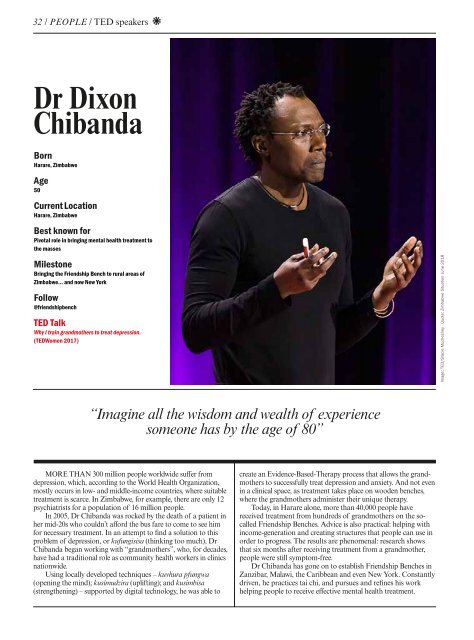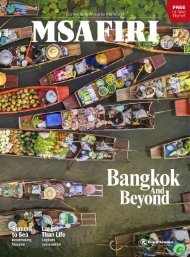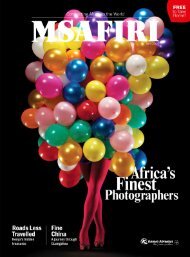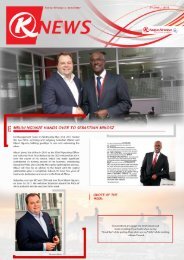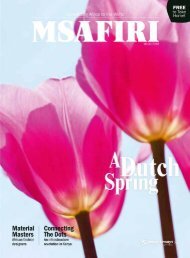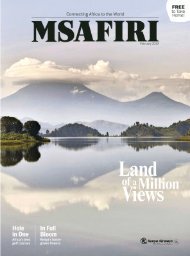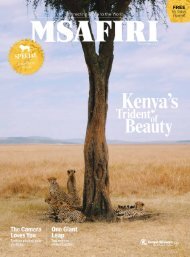january-2019
January Issue
January Issue
Create successful ePaper yourself
Turn your PDF publications into a flip-book with our unique Google optimized e-Paper software.
32 / PEOPLE / TED speakers<br />
PEOPLE / 33<br />
Dr Dixon<br />
Chibanda<br />
Sisonke<br />
Msimang<br />
Born<br />
Harare, Zimbabwe<br />
Born<br />
Manzini, Swaziland<br />
Age<br />
50<br />
Age<br />
44<br />
Current Location<br />
Harare, Zimbabwe<br />
Current Location<br />
Perth, Australia<br />
Best known for<br />
Pivotal role in bringing mental health treatment to<br />
the masses<br />
Milestone<br />
Bringing the Friendship Bench to rural areas of<br />
Zimbabwe… and now New York<br />
Follow<br />
@friendshipbench<br />
TED Talk<br />
Why I train grandmothers to treat depression.<br />
(TEDWomen 2017)<br />
Image: TED/Stacie Mcchesney Quote: Zimbabwe Situation June 2018<br />
Best known for<br />
Writing and incisive storytelling<br />
Milestone<br />
Becoming Executive Director at Open Society<br />
Initiative for Southern Africa<br />
Follow<br />
@Sisonkemsimang<br />
TED Talk<br />
If a story moves you, act on it. (TEDWomen 2016)<br />
Nick White<br />
“Imagine all the wisdom and wealth of experience<br />
someone has by the age of 80”<br />
“You can’t force justice. It’s the result of working with people,<br />
listening and creating opportunities for change”<br />
MORE THAN 300 million people worldwide suffer from<br />
depression, which, according to the World Health Organization,<br />
mostly occurs in low- and middle-income countries, where suitable<br />
treatment is scarce. In Zimbabwe, for example, there are only 12<br />
psychiatrists for a population of 16 million people.<br />
In 2005, Dr Chibanda was rocked by the death of a patient in<br />
her mid-20s who couldn’t afford the bus fare to come to see him<br />
for necessary treatment. In an attempt to find a solution to this<br />
problem of depression, or kufungisisa (thinking too much), Dr<br />
Chibanda began working with “grandmothers”, who, for decades,<br />
have had a traditional role as community health workers in clinics<br />
nationwide.<br />
Using locally developed techniques – kuvhura pfungwa<br />
(opening the mind); kusimudzira (uplifting); and kusimbisa<br />
(strengthening) – supported by digital technology, he was able to<br />
create an Evidence-Based-Therapy process that allows the grandmothers<br />
to successfully treat depression and anxiety. And not even<br />
in a clinical space, as treatment takes place on wooden benches,<br />
where the grandmothers administer their unique therapy.<br />
Today, in Harare alone, more than 40,000 people have<br />
received treatment from hundreds of grandmothers on the socalled<br />
Friendship Benches. Advice is also practical: helping with<br />
income-generation and creating structures that people can use in<br />
order to progress. The results are phenomenal: research shows<br />
that six months after receiving treatment from a grandmother,<br />
people were still symptom-free.<br />
Dr Chibanda has gone on to establish Friendship Benches in<br />
Zanzibar, Malawi, the Caribbean and even New York. Constantly<br />
driven, he practices tai chi, and pursues and refines his work<br />
helping people to receive effective mental health treatment.<br />
“WE LIVE IN a time where we’re witnessing the decline of<br />
facts,” says Msimang during her TEDWomen 2016 Talk. “A<br />
recent report by the Pew Center on trends in America indicates<br />
that only 10 percent of young adults under the age of 30 ‘place a lot<br />
of trust in the media’.” Conversely, they do have more respect for<br />
storytelling, which sets a dangerous precedent.<br />
According to Msimang, facts are needed, together with stories,<br />
to move the needle towards social justice. Even stories written<br />
with the best intentions can have negative consequences by glossing<br />
over real issues when they don’t include all of the facts of a given<br />
situation. Msimang has a lot of experience dealing with people’s<br />
everyday stories, which are often different to those that enter the<br />
mainstream. In her recently released memoir, Always Another<br />
Country, she speaks of “bearing witness to stories” while leading<br />
the oral storytelling programme at the Centre for Stories in Perth,<br />
Australia, where she helps refugees and diverse people to find<br />
their voices.<br />
Forged by a peripatetic lifestyle that wheeled her through<br />
Zambia, Kenya, Ethiopia and Canada as the child of South African<br />
freedom fighters in exile, Msimang’s outlook was heavily shaped<br />
by her parents. “They had the capacity to respect the dignity of<br />
each person, which is central to how I think about my work,” says<br />
Msimang. On returning to South Africa in 1990, she entered the<br />
world of activism, before moving towards journalism as disillusionment<br />
with the Rainbow Nation dream set in. “The most<br />
poignant story can get in the way of social justice,” she says in<br />
the Kirkus Reviews (November 2018). “You feel like you have...<br />
befriended that death row inmate. But you didn’t. So stories<br />
become useful only if they allow you to think about the world,<br />
become more critical and act in better ways.”


